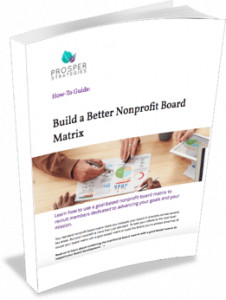The most effective nonprofits have four things in common: they are well differentiated from others that provide similar services; they plan proactively, yet remain agile; they engage the right people at the right times in their decision making; and they focus on outcomes across everything they do.
Effective Nonprofits are Differentiated
The most effective nonprofits are internally aligned about their nonprofit mission, services, brand assets and other strengths. And, they consistently communicate externally in ways that resonate with their most important stakeholders. All of this starts with their ability to successfully differentiate from other nonprofits that provide similar services. When your nonprofit is sufficiently differentiated, you can articulate your unique positioning, which clarifies your ability to make strategic decisions and helps you build a stronger case for support.
As an example, we work with a human services nonprofit that supports youth experiencing homelessness. There are other organizations that do the same thing across the country, and certainly where they are located in Chicago, however after reviewing their strengths and the local nonprofit landscape, we discovered their unique difference was, in one word: community. From youth to donors to partners, everyone talked about the connections and community that was created through the nonprofit’s programs. It was this sense of community that many clients credited in helping them through their journey to stable housing. Recognizing and then elevating this differentiator made strategic planning decisions easier, as the nonprofit knew it wanted to center its efforts on maintaining and building its community, and provided clear direction for marketing and fundraising campaigns that would amplify the role the community plays in the organization’s work.
Effective Nonprofits are Agile
No question, the most effective nonprofits are proactive. This means that they have a strategic plan, they are clear about their goals and objectives, roles and responsibilities, and they are in control. However, they must also be agile. When situations like COVID-19 hit, nonprofits that already had plans in place were much better prepared to weather the storm because the focus was less on creating a new plan and more on pivoting an existing plan.
[bctt tweet=”No question, the most effective nonprofits are proactive. This means that they have a strategic plan, they are clear about their goals and objectives, roles and responsibilities, and they are in control. They must also be agile.” username=”ProsperStrat”]Bringing this example to life, one of our nonprofit clients is a national organization that supports a network of out-of-school programs across the country. They had a clear strategic plan that called for scaling their programs, growing their network, ensuring quality and raising awareness. When COVID-19 hit, these four objectives didn’t change, only the way they planned to reach them did. In their case, all of their out-of-school programs transitioned to remote, so students were still able to access learning experiences outside of a traditional classroom setting.
Effective Nonprofits Engage their People
Effective nonprofits not only have the right people in the right roles, they engage their people in decision making. There are many ways to do this, however, formalizing the process sets expectations among your stakeholders for when and how feedback will be gathered. Many Prosper clients use a mix of surveys, interviews, focus groups and field studies to gather feedback from those who matter most to their nonprofit and its future. And they use this information to inform their nonprofit strategic planning, program planning, marketing and fundraising campaigns and overall storytelling.
One of our nonprofit clients, for example, was considering changing their name. However, they weren’t sure how it would be received by their clients, donors and community partners, so they decided to find out. They conducted a survey to understand perceptions of their nonprofit today, how people felt about the name and what the openness was to changing it within their community. The results of the survey led the nonprofit to move forward with a renaming and rebranding, and all of those involved felt confident about it based on the results of the survey. The information gathered was also used to help determine what the new name should be.
Effective Nonprofits Are Outcome Oriented
At every level, effective nonprofits focus on outcomes. From strategic planning to the way nonprofit boards and teams are built. However, for many organizations, this can be daunting, but it doesn’t have to be. With our nonprofit clients, we use tools like the Impact Genome to help them start defining and measuring their social change one program at a time.
What do you think makes the most successful nonprofits effective?  Drop a note in the comments below. And, are you looking to build a better board, one that supports the outcomes your organization seeks to drive? Download our board matrix template to learn about combining the traditional board matrix with a goal-based matrix to support your board development.
Drop a note in the comments below. And, are you looking to build a better board, one that supports the outcomes your organization seeks to drive? Download our board matrix template to learn about combining the traditional board matrix with a goal-based matrix to support your board development.